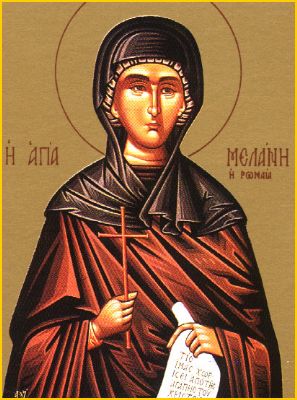|
|||
|---|---|---|---|
| This weekly bulletin insert complements the curriculum published by the Department of Christian Education of the Orthodox Church in America. This and many other Christian Education resources are available at http://dce.oca.org. | |||

In Hebrews 10:35-11:7, we are cautioned not to "throw away your confidence." We are reminded that we need endurance, and that "we are not of those who shrink back and are destroyed, but of those who have faith and keep their souls." We read about Noah, who was faithful when he was warned by God "concerning events yet unseen." Saint Melania is called "the Younger" to distinguish her from her grandmother, who is also a saint of the Church. The young Melania was raised in Rome as a Christian by her devout and wealthy parents, and did not face government persecution as a believer. Yet she would face other difficulties. She would have need of the "confidence" mentioned in Hebrews and would need to carry with her the kind of faith that gives us "the assurance of things hoped or, the conviction of things not seen" (11:1). Melania was strongly influenced by the example of her holy grandmother, who was widowed early and later established a monastery with one house for women and another for men. Melania wanted to dedicate her life to God and was never interested in marriage. But her parents wanted heirs, and in reluctant obedience Melania entered into an arranged marriage. Even though she had not been enthusiastic about marrying, she and her husband Pinianus came to share a deep love. They also shared deep tragedy: the girl and boy born to them both died. For years afterward Melania wept and grieved in isolation at home. It was a terrible test of her confidence and faith in God. Finally she was able to turn her profound grief into service to others. Leaving Rome, she and Pinianus traveled to Egypt, Syria, and Palestine, in each place helping the poor and building churches and hospitals. Then they sailed to Africa to do the same. As always, she prayed constantly, fasted, and studied Scripture and patristic works. Pinianus had agreed that they would live as brother and sister, devoting themselves to God, and joined her in these spiritual endeavors. After seven years in Carthage the couple went to Jerusalem. There Melania established a women's monastery on the Mount of Olives. Sorrow struck her again in 432 with the death of Pinianus. As once before, she retreated into grieving isolation, emerging after four years to establish a men's monastery, partly as a symbol of her love for him. She then went on to Constantinople. There her hard-won confidence and faith in God expressed themselves in her ability to convert people to the truth. Many who had accepted Nestorianism found their way back, through her gentle correction, to authentic Christianity. She also converted her pagan uncle. But Melania never allowed confidence and certainty in her faith to make her self-important. She exhorted the nuns in her monastery to be humble, and she and her sisters were known for "offending none, and being helpers of the whole world." |
|||
